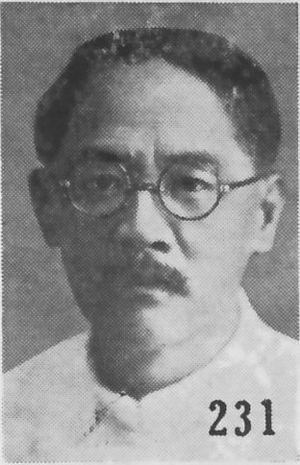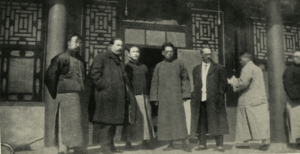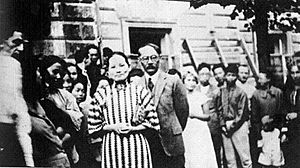Eugene Chen facts for kids
Quick facts for kids
Eugene Chen
|
|||||||||
|---|---|---|---|---|---|---|---|---|---|
|
陳友仁
|
|||||||||

Eugene Chen as pictured in The Most Recent Biographies of Chinese Dignitaries
|
|||||||||
| Minister of Foreign Affairs | |||||||||
| In office June 1, 1931 – 1932 |
|||||||||
| Preceded by | Alfred Sao-ke Sze | ||||||||
| Succeeded by | Luo Wengan | ||||||||
| Personal details | |||||||||
| Born | 2 July 1878 San Fernando, Trinidad and Tobago |
||||||||
| Died | 20 May 1944 (aged 65) Shanghai, Reorganized National Government of the Republic of China |
||||||||
| Resting place | Babaoshan Revolutionary Cemetery, Beijing, China | ||||||||
| Political party | Kuomintang | ||||||||
| Spouses |
Agatha Alphosin Ganteaume
(m. 1899; died 1926)Georgette Chen
(m. 1930) |
||||||||
| Children |
|
||||||||
| Parents |
|
||||||||
| Chinese name | |||||||||
| Traditional Chinese | 陳友仁 | ||||||||
| Simplified Chinese | 陈友仁 | ||||||||
|
|||||||||
Eugene Chen or Chen Youren (Chinese: 陳友仁; Wade–Giles: Ch'en Yu-jen; born July 2, 1878, in San Fernando, Trinidad and Tobago – died May 20, 1944, in Shanghai) was an important lawyer and politician. In the 1920s, he became the foreign minister of China. He was known for helping Sun Yat-sen with his plans to make China stronger and more independent.
Contents
Early Life
Growing Up in Trinidad
Eugene Chen was born in San Fernando, Trinidad and Tobago. His parents were Chinese immigrants named Chen Guangquan (also known as Joseph Chen or Achan) and Mary Longchallon (Marie Leong). They had three sons, and Eugene was the oldest. His parents had moved to the French West Indies before settling in Trinidad. To be allowed to immigrate, they had to become Catholic.
School Days
Eugene went to a Catholic school called St Mary's College in Trinidad. After finishing school, he became a lawyer. He was known as one of the best lawyers in the islands. At home, his family did not speak Chinese, and there were no Chinese schools. So, Eugene never learned to read or write Chinese. People said he spoke English very well, like a scholar.
Working for China
After becoming a lawyer, Eugene Chen moved to London. There, he heard Sun Yat-sen speak at a meeting. Sun Yat-sen was working to create a new government in China. He convinced Eugene to come to China in 1912 to use his legal skills. Eugene traveled by train across Russia, on the Trans-Siberian Railroad. On this journey, he met a doctor named Wu Lien-te. Wu suggested the Chinese name "Youren" for Eugene. This name means "friend of benevolence" and sounded similar to "Eugene."
A New Career in Journalism
In 1913, Sun Yat-sen had to leave China. Eugene Chen stayed in Peking and started a new job in journalism. He edited a newspaper called Peking Gazette from 1913 to 1917. Later, he started the Shanghai Gazette. This was the first newspaper in a network that Sun Yat-sen hoped to create across China. Eugene Chen became a strong critic of the government. He accused them of "selling China" and was put in prison for it.
Working with Sun Yat-sen
In 1918, Eugene Chen joined Sun Yat-sen in Canton. He helped represent the southern government at the Paris Peace Conference. There, he spoke out against plans that would harm China's interests. By 1922, Eugene Chen became Sun Yat-sen's closest advisor on foreign affairs. He believed China should be strong and independent. He also supported Sun's alliance with the Soviet Union (Russia).
Important Diplomatic Work
Eugene Chen was a very important diplomat (someone who handles relations between countries) for China in the 1920s. He helped China regain control of its own land and rights. He worked well with Michael Borodin, a Soviet advisor who helped reorganize the Nationalist Party in 1923.
After Sun Yat-sen passed away, Eugene Chen was chosen for important roles in the Nationalist Party. In 1926, he became the Nationalist Minister for Foreign Affairs. He also became a leader in Hankow. He had to leave these roles in April 1927.
Regaining Control of Concessions
Over the next two years, Eugene Chen spoke out to the American and British governments. He wanted China to take back control of areas that foreign countries had been managing in China. He also talked with British authorities about labor strikes. When Chiang Kai-shek's Northern Expedition was close to uniting the country, Eugene Chen joined a different Nationalist government in Wuhan.

In January 1927, the Nationalists took control of the British area in Wuhan. When crowds also took control of the foreign area in Kiukiang, foreign warships gathered in Shanghai. Eugene Chen talked with the British, and in February 1927, they reached an agreement. This agreement allowed China and Britain to manage the area in Wuhan together. By 1929, the British area in Wuhan was fully returned to Chinese control. This was a big step for China to gain more control over its own land.
Leaving China
In March 1927, as the National Revolutionary Army got closer to Nanjing, there was violence against foreigners. Also, Chiang Kai-shek started attacking Communists in Shanghai. Eugene Chen sent his sons Percy Chen and Jack Chen, and others, by car across Central Asia to Moscow. He, his daughters Si-lan and Yolanda, Mme. Sun Yat-sen, and an American journalist traveled from Shanghai to Vladivostok, and then by train to Moscow.
Life in Moscow in 1928 was not easy. After a warm welcome, Joseph Stalin did not want people who reminded him of Russia's failures in China. Eugene Chen was unhappy with Russia's attempts to control Chinese politics, so he left Moscow. After some time away, he went to Hong Kong before becoming foreign minister again.
He served in Chinese governments that challenged the Nanking government. In 1934, he was removed from the Kuomintang party for being foreign minister during the Fukien Rebellion. He then went to Paris for safety, but later returned to Hong Kong. In 1942, he was taken to Shanghai. People hoped he would support the Japanese government that controlled parts of China. But he continued to speak out against them until he passed away in May 1944, at 66 years old.
Family Life
In 1899, Eugene Chen married Agatha Alphosin Ganteaume (1878–1926), also known as Aisy. She was a French Creole whose father owned a large estate in Trinidad. They had eight children, but only four lived past childhood:
- Percy Chen (1901–1986): A lawyer who worked with his father.
- Sylvia (Silan) Chen (1905–1996): A famous dancer.
- Yolanda (Yulen) Chen (1913–2006): She stayed in Russia and became a well-known camerawoman.
- Jack Chen (1908–1995): He became a famous cartoonist and relief worker.
Aisy passed away in May 1926 from breast cancer. In 1930, Eugene Chen married Georgette Chen. They stayed together until his death in 1944.
 | Shirley Ann Jackson |
 | Garett Morgan |
 | J. Ernest Wilkins Jr. |
 | Elijah McCoy |


